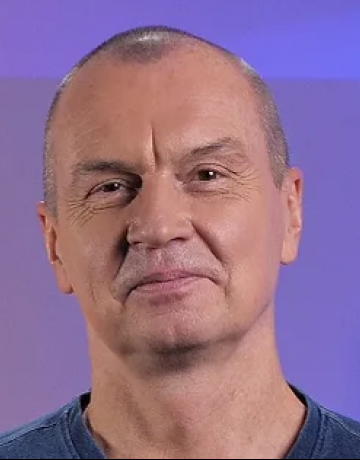
Mikhail Lebedev
Scientific Director, Center for Bioethical Interfaces, Institute of Cognitive Neurosciences, NRU HSE
Scientist, author of more than 100 scientific works.
He was born in Moscow in 1963. He studied at the 60th special school in Maly Kislovsky Lane (now school 1243), from which he graduated with a gold medal in 1980. In 1980–1986 he studied at MIPT in the Department of General and Applied Physics (PHPP), in the Department of Living Systems. Vyacheslav graduated from MIPT with honors.
From 1986 to 1991 he was a staff member of the Institute for Information Transmission Problems, worked in the laboratory of V. С. Gurfinkel, where he was involved in research on the regulation of human posture and electrical activity of muscles.
From 1991 to 1995 he was a graduate student at the University of Tennessee, Memphis, USA. His dissertation was devoted to the study of monkey brain activity (somatosensory and motor cortex and basal ganglia) during movements.
From 1995 to 1997 he worked in Trieste, Italy, where he studied the plasticity of the somatosensory cortex in rats. From 1997 to 2002 he worked at the National Institutes of Health in Bethesda, USA. He conducted research (on monkeys) on cortical mechanisms of memory, attention, and motor planning.
Since 2002 he has been a senior researcher at Duke University in Durham, USA. Developed invasive neurocomputer interfaces that decode brain activity and transmit sensory information to the brain via electrical stimulation. Showed in experiments on monkeys that by using multi-channel cortical implants you can directly control the activity of the brain movements of mechanical and virtual limbs: prosthetic arms and legs. Also his experiments on monkeys showed that through electrical stimulation of somatosensory cortex it is possible to effectively restore tactile sensations. Developed neurocomputer interfaces to control wheelchair movements (also experiments on monkeys).
Mikhail is the editor of several scientific journals in neurophysiology and neuroengineering. He won a contest for the best special issue of Frontiers in Neuroscience, and as a prize received funds to organize the conference "Extension of Brain Functions," which was held in Lausanne in 2018.
In 2017, he won a megagrant from the Russian Federation government. The megagrant made it possible to open the Center for Bioelectrical Interfaces at the Institute for Cognitive Research at the Higher School of Economics. As the scientific director of the center, he is developing neurocomputer interfaces based on the technique of electrocorticography - minimally invasive implants that are used to diagnose patients suffering from epilepsy.
He received a grant from the Russian Science Foundation to open a world-class laboratory at Skoltech and headed the Center for Neurobiology and Neurorehabilitation at Skoltech.
He gave lectures numerous times at various conferences in Russia and abroad and collaborates with research and medical centers throughout Russia.



